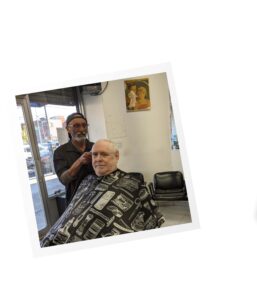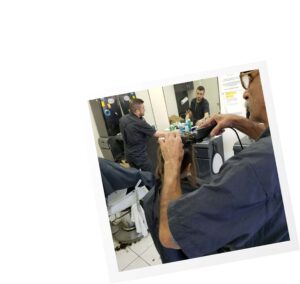Shear Mentch
Boris, Our Marine Park Barber
Ita Yankovitch
As I sit in Boris Mekhtiyev’s shop waiting for my son’s name to be called, I marvel at the melee of sounds that surround us. The hum of clippers, the snip-snip of scissors, and the buzz of razors mingle with the ringing phone as the door opens and closes and passersby tap on the glass and wave.
Boris (Baruch) Mekhtiyev is the proprietor of Universal Hair Salon on Nostrand Avenue and Avenue P, where he has been cutting hair for more than 20 years. Boris’ role extends beyond a good haircut; he serves as confidant, mentor, and friend to his ever-growing client base.
During my visit, a customer quips that the day Boris closes the shop is the day psychologists will see a boom in business. I have always been intrigued by Boris, but that comment compels me to learn more about the man behind the scissors.
From Afghanistan to Marine Park
Boris’ distinctive accent and dark complexion are common in Turkmenistan, where he was born, but his family’s roots are Afghan. Boris, one of five siblings, was born in 1955 to devout parents. He recalls hearing stories from his parents about his grandfather, who spent hours sitting on the floor learning Talmud back in Afghanistan.
“It was hard but peaceful,” Boris says of his life in Turkmenistan. “In some ways we had a better life than the Jews living in Ukraine or Belarus because we could observe Shabbos. We could go to shul, and we even baked our own communal matzos.”
Although it was a Communist country, its Muslim population respected religion and Jews were allowed to practice openly during his youth. Boris recalls the Muslim neighbors crying when their Jewish neighbors emigrated to America and Israel, acknowledging the blessing their neighbors brought to the country.
When Boris’ family lived there, about 160 Jewish families lived in the region, and the village had a rabbi, mohel, and shochet. Boris tells me that the Jewish community was very cohesive. If someone died or got married, everyone stopped what they were doing and attended the affair. Children learned about Yiddishkeit from their home. There was no cheder, but most knew how to read Hebrew. Boris’ family, like most in the village, lived in a modest one-floor home and raised farm animals. In 1996, the family emigrated to the United States to escape the poverty that plagued the region.
Today, Boris has come a long way from those humble beginnings. He has three sons – a lawyer, and architect, and a bank president – and five grandsons. His sons attended Yeshiva Be’er Hagolah when they were growing up, and one helped design Khal Ner L’ Meiah’s shul. His wife has been a medical assistant for 27 years at a local pediatric practice. The Mekhtiyev family is close knit with all the children living here in Brooklyn.

The Making of a Barber
This year marks Boris’ fiftieth anniversary as a professional barber. He began his career at the tender age of sixteen, when his father realized that academics didn’t appeal to Boris and set up an apprenticeship for him with the village barber. Boris’ father owned a photography business and taught his son the basics of lighting and angling. Boris realized that to give a good haircut, he could combine his knowledge of cutting with photography and produce excellent results. Word spread throughout the village and soon even government officials were coming to get their locks snipped by Boris.
Boris served in the Soviet military for a year and a half and went on to play professional soccer for Turkmenistan, but he says, “I knew that I couldn’t do that forever, since playing soccer takes a toll on the body and is not a good job for a Jewish man.” At age 27, Boris quit soccer and went back to being a barber.
Boris says that cutting hair requires skill. “You have to analyze the texture of the hair and study the person’s face and bone structure to figure out what style will look good on him,” he explains. “You must be skilled. You must be clean. It’s not about rushing the job.”
Boris bought Universal Hair Salon in Marine Park from an Italian barber after working for another barber on Avenue L for four and a half years. He passed Universal daily on the way to the park with his kids and fantasized about one day taking it over. Boris liked the location because it was near his house and shul. He knew that more Jews were moving to Marine Park and would want a frum barber. After deliberation, Boris approached Universal’s owner and asked if he needed a partner, but his offer was rejected. Not one to give up, each time he passed the business Boris made small talk with the owner. “I would come in and help him out in whatever way needed. I even swept his floor,” Boris recalls. His persistence paid off, and in 1998 the owner offered to sell the business to Boris.
Snipping B’ Simchah
When I pose the question of how he deals with difficult customers, Boris responds that there is no such thing. Our conversations are peppered with references to his clients as his “brothers,” “friends,” and “people.”
“It’s a mitzvah to be b’simchah,” Boris tells me. “Back in Turkmenistan, I used to hang out in the streets a lot. One time after a long night out, I lost track of time and didn’t come home until the morning. My mother was waiting for me outside and did not look happy. She took off her soft house slipper and slapped my shoulder with it, telling me how worried she was about me. She never hit me before.” His mother asked him if he would daven to Hashem if she was ever sick in the hospital. When Boris answered in the affirmative, she retorted, “Why would Hashem listen to your tefillos? If you want Hashem to listen to you, you must establish a line of credit with him, and the only way to get credit is by doing chessed.” Boris took her words to heart. He buckled down, got serious, stopped hanging out in the streets, and made it his mission to do good for others at every opportunity.
Boris loves the community, and they love him right back. Boris is often invited to his client’s simchos. When his mother passed away 15 years ago, his home was full of clients who came to be menachem avel. A member of the community arranged a beautiful kiddush at a local hall for his son’s bar mitzvah. Each morning, boys from Rabbi Zucker’s yeshivah come in to greet him and exchange high-fives Boris gets emotional when he recalls how the community was there for him with meals and concern following a recent medical procedure.
Boris knows about each client’s life, including their job, family, and medical or personal issues. As I interview Boris, a distinguished looking rabbi walks in carrying a Gemara. His somber mood instantly changes when Boris greets him, inquiring about his newborn daughter’s upcoming appointment. Following their exchange, I ask the man how long he has been coming to Universal. “Since I was nine,” he responds, “and now my boys come here too. The funny thing is, I don’t even live here! I make the trip because Boris is a legend.”
“You have to know how to talk to people,” Boris says. “Life is hard for everyone, and when people sit in this chair they need an escape.”

Can You Cut it?
“I gave upsherin to boys whose fathers I gave upsherins to,” Boris says. His workday is from 7 to 7. “I may be tired, but these are my customers, and I am lucky to have them. They are my family.”
There are days when all Boris eats is a banana. “I am on my feet all day. Lag BaOmer, Tisha B’ Av, and the end of sefirah are stressful, since a lot of people are waiting and want me to finish faster. You have to know how to answer each customer differently when they pressure you. There is no point in getting angry. I try to reason with them. I joke with them. If I cannot accommodate someone, I take their number and call them when it is a good time to return; this way I can give them my full attention.”
So, what does Boris do during sefirah or when he is off? He has a hodgepodge of hobbies, including gardening and raising birds. Boris shows me cell phone videos of 150 pigeons of different varieties that sit in cages on his property as well as his beautiful flower and vegetable gardens.
Recently, another barber shop opened a few blocks away, and I ask Boris if he worries about the competition. “Baruch Hashem, I am very busy,” he replies. “Everything is from Hashem. Hashem provides enough for everybody.” He assures me that if someone does a decent job, the people will continue coming even if the wait is longer and the prices are higher. This is evident in the line starting to form outside Universal as we continue to speak. I pose the question to some of the customers on why they are here, and the response is the same: “No one cuts hair like Boris!”
I end my interview by asking Boris if he would recommend his occupation to others, and he pauses for a few moments before answering that being a barber is not an easy job. Boris tells me that long hours of standing are taxing on the body. “One has to have good hands and a good eye,” he adds. “Besides knowing how to cut hair, you must be patient, sensitive, and a good listener. You are always on call. I can never take a vacation before Pesach or Sukkos because the community needs me.”
I ask Boris if he plans to retire eventually, and the customers applaud when he replies, “No. As long as my hands are not shaking and people are happy with my work, I will continue.”
Boris gestures around the room. “Hashem has blessed me. He somehow put it in my eyes and head how to make people look good. These are my brothers, and I will not leave them.”
You must be logged in to post a comment.